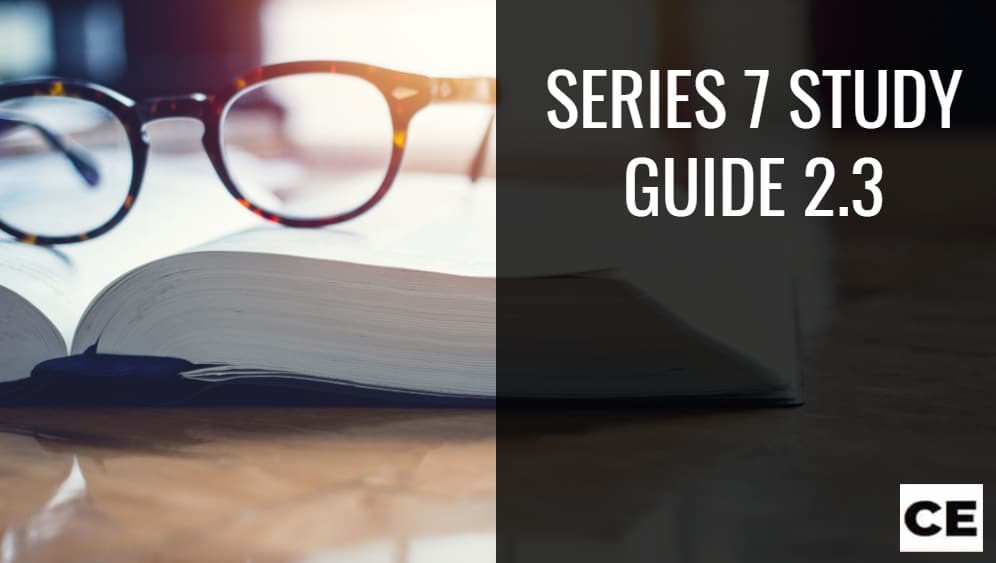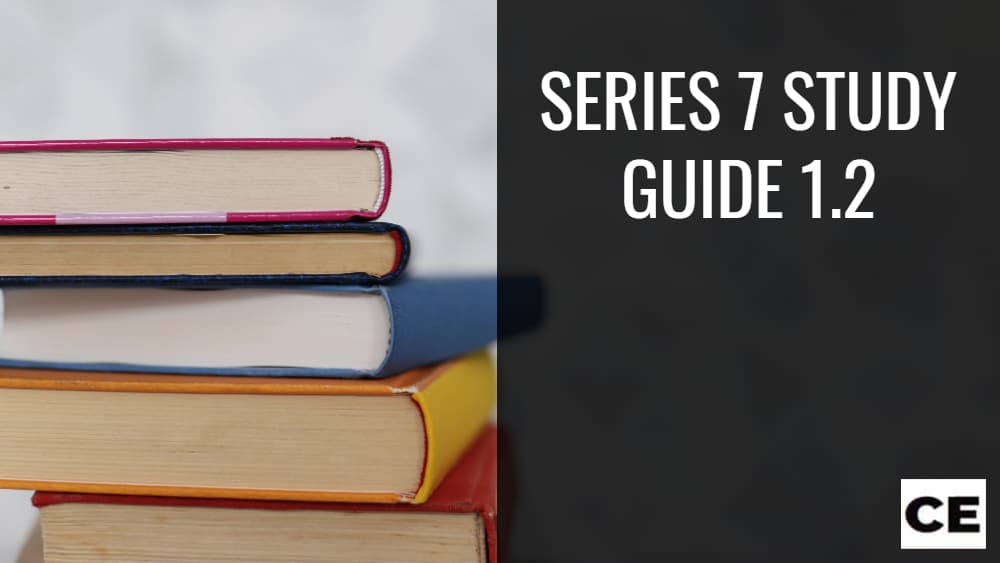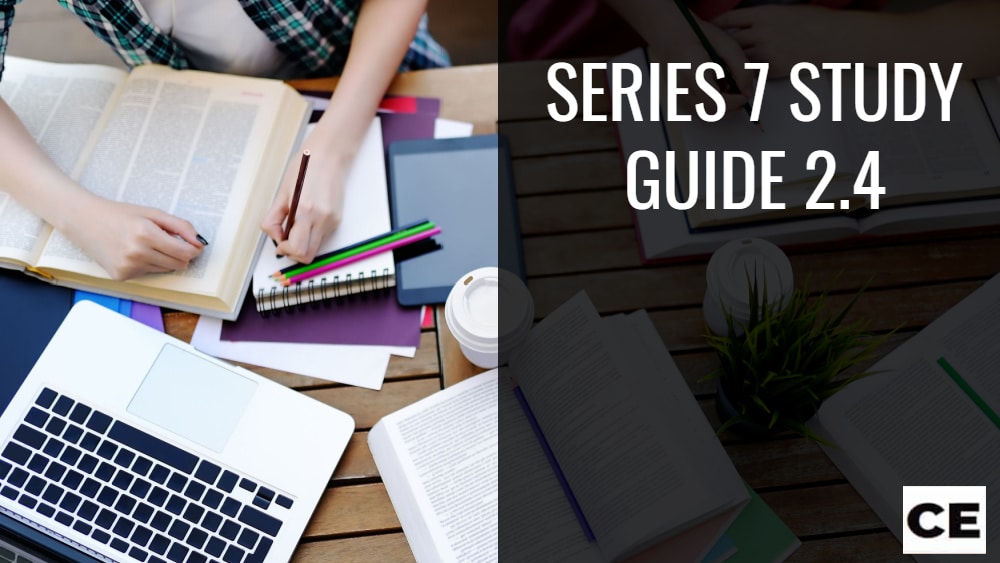Hey there, and welcome to our informative read on Series 7 study guide.
This is the third article in our Series 7 study series.
Find study guides for the fourteen chapters covered in the four functions of the investment company and variable contracts products representative tested in the Series 7 exam.
We’ve also discussed tips to help you make the most of the Series 7 study guide and why it’s important to use the guide.
Let’s get started right away.
Other free series 7 study materials:
- Series 7 exam prep
- Series 7 study plan
- Series 7 study guide
- Series 7 practice exams
- Series 7 flashcards
- Series 7 cheat sheet
- Series 7 Exam FAQ
- Best Series 7 study materials
The best way to prepare for any exam is to follow the guidelines set out for it.
FINRA does an excellent job in that regard and we’ve followed the Series 7 guideline that you will find here.
Module 1 | Finding business opportunities for broker-dealers from both potential customers and current customers
This module specifically deals with communication with the public as well as the investment products and services offered in an attempt to solicit business.
First, we look at the types of communication allowed, the standards expected by regulatory authorities, and advertising about various investment products.
Following that, the focus turns to investment products and services for potential customers and much more.
1.2 Describing investment products to potential and current customers
Module 2 | Starting an account after obtaining and evaluating the financial profile and investment objectives of a customer
In this, we cover the functions that general securities representatives carry out specifically related to opening accounts.
Without these accounts opened with broker-dealers, an investor has no way of engaging in securities transactions.
2.1 Tells potential customers about the account types available and discloses their restrictions
2.2 Secures and updates information about customers along with relevant information and documents
2.3 Gather customer investment profile information
2.4 Get necessary supervisory approval to open accounts and make account changes
Module 3 | Giving clients investment information, making recommendations, transferring assets, and keeping suitable records
There’s a lot covered in this module regarding the information passed on to clients.
This includes making the right investment recommendations, for example.
This module also deals with the records kept regarding clients as well as how assets are transferred among so much more.
3.1 Passing on all investment strategy information to customers
3.2 Analyze customer’s portfolio of investments as well as product options to determine suitability
3.3 Disclose to clients characteristics and risks of investment products
3.4 Communications with customers
Module 4 | Customer purchases and sales instructions and agreements obtained and verified; transactions processed, completed and confirmed
Our last module looks at three specific areas.
First, we discuss the types of orders and quotations a registered representative must know.
Secondly, we discuss the processing of various transactions.
Thirdly, we cover the resolution of customer complaints.
4.1 Providing current quotes for investors
4.2 Processing and confirming customers’ transactions as per regulations
4.4 Dealing with margin issues
Tips for Success Using Series 7 Study Guide
The series 7 licensing exam is one of the most challenging exams among the Financial Industry Regulatory Authority.
You need all the help you can get to adequately prepare for the exam.
Our free Series 7 study guide is the perfect tool to study your way into passing the exam on the first attempt.
So, we’ve developed excellent tips to ensure you use the study guides to the maximum.
Review the List of Concepts
Before you delve into the content of the Series 7 study guide, familiarize yourself with the chapters in the guide.
Generally, scan through the different chapters to see the key ideas.
You can take short-hand notes or not.
It all depends on your learning style.
The idea is to have a rough overview of the Series 7 content before you get knee-deep into studying.
Focus on the Main Concepts in Each Chapter
Generally, the Series 7 study guide zeros in on the main concepts in each chapter.
However, when using the guide, you want to pay special attention to each section.
Outline key concepts like formulas, definitions, and regulations.
Ensure you clearly understand the key ideas discussed in each chapter.
You can write the main concepts down or highlight them.
This way, you can easily return to them when you need to refresh your memory.
In the same breath, highlight difficult concepts so you can read more about them in other study materials or through research.
Make an effort to identify and explain the relationship between ideas or topics.
When you link concepts, it makes it easy to recall that information.
Seek Additional Resources, Explanations, and Definitions
Using our study guide is an excellent idea.
But don’t let it stop there.
Google is a hub of information.
Do research online to understand definitions or concepts that are not straightforward.
Getting different perspectives gives you a unique understanding.
Further, you’ll explore concepts fully.
You can get more clarification and have broader knowledge that makes it easy to apply the concepts.
Go Through Your Other Study Materials
Besides the Series 7 study guide, our Series 7 study hub has several other study tools, including cheat sheets, practice questions, study plans, and flashcards.
We’ve created all these resources with you in mind.
We want to ensure you have all the necessary knowledge to meet the Series 7 pass score.
Using our Series 7 study guide together with our other materials will give you the best results.
Change Study Location
Monotony can sometimes interfere with your learning.
So, change your study location every once in a while.
If your study area is in your sitting room, you can shift it to the bedroom.
Sometimes, study in the dining area, on the couch, or backyard.
A new environment is refreshing.
It triggers your mind to learn and memorize information better.
Make the Most of Your Time
If you have a tight work schedule, try to squeeze in time to review your study guide at every chance.
The good news is that our guide is digital.
You can read it on your phone in the washroom, when commuting, in between meetings, or even over lunch break.
The more you go through the material, the more the information sticks.
Benefits of Using FINRA Series 7 Study Guide
Most Series 7 prep packages come with a study guide, and for a good reason.
A study guide helps you manage Series 7 content.
It breaks the information and the key concepts in an easy-to-understand manner.
Again, a study guide gives you detailed information about a single concept.
You can delve deeper into the main idea to a greater length.
That makes it easy to remember and apply the concepts.
It also helps better manage your study time and learning.
Instead of referring to a prep course textbook, you can quickly retrieve information from the guide.
Additionally, it makes revisions easy.
Moreover, study guides are usually more engaging than textbooks.
You can better interact with the content and retain more information.
Conclusion
When it’s all said and done, it all boils down to you.
A study guide gives you an overview of the general securities representative exam content in a clear and precise manner.
You can pick the key areas that require your full concentration and devour them when you are most productive.
The tips above will help you get the most out of our free Series 7 study guide and be well-prepared for the Series 7 test.
Frequently Asked Questions
What is the best way to study for Series 7?
– Review the FINRA Series 7 exam content outline and develop a study plan
– Create a routine that syncs with your lifestyle
– Leverage prep course study materials
– Check your progress using practice tests
– Take full-length Series 7 practice exams
– Prepare for the exam day
Is there a lot of math on Series 7?
No! Maths make up 30% of the exam. The qualitative concepts are in margin, options, and convertible bonds topics. These topics should give you bonus points if you are good at maths. If you are not, block specific study time for these topics. The 30% shouldn’t go to waste.
Is CFA harder than Series 7?
Yes. Certified Financial Analyst is harder than the Series 7 exam. Series 7 exam covers knowledge about registered representative roles, while the CFA exam tests investment professionals on investment tools, portfolio management, wealth planning, and valuing assets. It’s a three-part certification exam equivalent to a master’s degree.
What happens if you fail Series 7?
If you fail the Series 7 exam, you must wait for 30 days before you retake the exam. The retake cost is $245, just like taking the exam for the first time. Failing three times in succession will require you to wait 180 days before retaking the exam.
Is the Series 7 exam hard?
Yes. The Series 7 exam is difficult. The exam’s passing score is 72%, and only 65% of test takers pass the first time. Given the pass rate, you can tell it requires ample preparation. So, make the most of the Series 7 exam study materials.
How many times can you take Series 7?
There is no limit to how many times you can take the Series 7 exam. If you fail the first three attempts, FINRA allows for sitting for the exam after 30 days. If you fail again, you’ll have to wait six months to retake the exam.
Can you get your Series 7 without a sponsor?
No. You can’t! According to the Financial Industry Regulatory Authority, you can only take the Series 7 exam if you are sponsored by an SRO or FINRA member firm. Only the sponsoring firm can complete the Uniform Application for Security Industry Registration to register you for the Series 7 exam.
How long should I study for Series 7?
The duration it takes to study for Series 7 varies depending on the individual. Some take a month to complete their test prep. Others require up to two months or more. The determinant factor is whether you have a background education or experience in the financial securities industry.
Do I need to study for the Series 7 exam?
Yes. To pass the Series 7 exam, you must study for it. The exam covers four registered representative functions tested in 135 multiple-choice questions. Purchase a Series 7 exam prep course package and create a study plan to cover the materials. You can test your understanding using practice questions.
How can I pass Series 7 in a week?
To pass the Series 7 exam in a week, you’ll have to block the whole week for studying for the Series 7 exam. Have all the study materials at hand, and start your preparation with the highly weighted sections. Dedicate 20-30 hours to Series 7 practice exams and tests.
How do I study for the Series 7 top-off?
– Outline your daily commitments from job to family to hobbies
– From the list, create study time
– Commit to studying a chapter of the Series 7 exam content daily
– Take Series 7 practice questions at the end of each chapter
– Review the questions
-Take practice exams
What are the best resources for studying for Series 7?
The best resources include:
– Series 7 practice questions
– Series 7 study guide
– Series 7 study plan
– Series 7 study flashcards
– Series 7 practice questions
These resources, when used together, will help you cover every angle of the Series 7 exam.
What are the Series 7 study materials?
The best study materials in the industry include:
-Securities Institute of America
-Securities Training Corporation
-Kaplan Financial Education
-Knopmanmarks
-ExamFX
-Achievable
These Series 7 exam prep courses have the best study materials for test takers. The price points vary depending on the package you’ll settle for.
Should I read the Series 7 handbook?
Yes. The Series 7 handbook gives you an overview of the Series 7 exam content. You can read it once and then use the Series 7 study guide to find the key areas. Make use of Series 7 flashcards and practice exams too. Video lectures are also handy study materials.
How many questions are on Series 7?
The Series 7 exam has 135 questions, of which ten are unscored. The exam takes 3 hours and 45 minutes to complete. That means you have around one minute and 30 seconds to answer each question. Learn to pace yourself early on using FINRA Series 7 practice exams.
What is a Series 7 license?
Test-takers earn a Series 7 license after passing the Series 7 and SIE exam. It’s an entry-level license that allows general securities representatives to sell and buy several securities products, except for life insurance products, futures, and real estate. To sell these products, you must pass the Series 6 exam.
References









